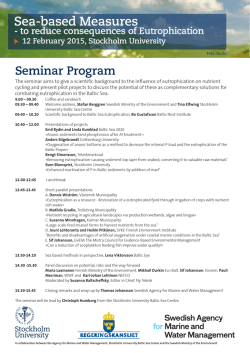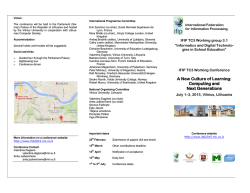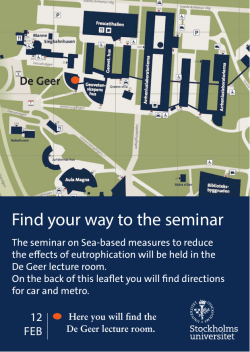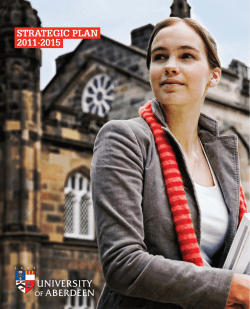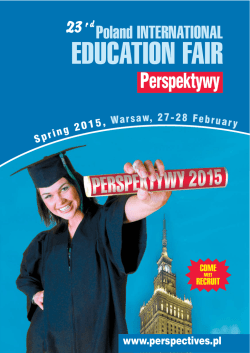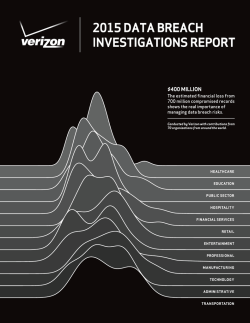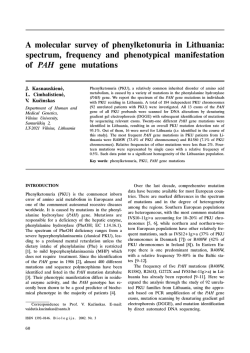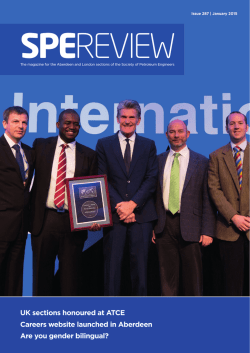
HERA Joint Research Programme
HERA Joint Research Programme Application Template for a Project Idea to attend the Matchmaking Event on 29th January 2015 in Tallinn, Estonia Name and Organisation of the Applicant: Dr. Arūnas Vyšniauskas (Vilnius University) / M.A. Mindaugas Šapoka (PhD Student – University of Aberdeen) Title of the Project Idea: The comparative history of international military incidents in the global (sub-)region of Baltic Sea The Project Idea should include the following elements: Part 1: Project Idea description, structured as outlined below and not exceeding a maximum of 800 words in total. Part 2: a one-page CV of the proposer with up to 5 main publications and major project experience. 1.a A short description of your Project Idea and its objectives International military incidents, which had led to wars, occupations, or great changes in the international situation, are mentioned in the scholarship, but they are treated as one of the prima causa details in the margin of later events. Through the analysis of resonant incidents it is possible to reveal the complex interaction of inter-state relations which emerges in times of crises, the motives of decisions in state politics and other relevant factors in history. The group of Lithuanian scholars, which consists of specialists in Lithuanian and Global history (dr. Arūnas Vyšniauskas and others), are seeking to write a scholarly monograph in which key military incidents in the world that took place over the past several centuries would be analyzed with special focus on the countries of Baltic Sea (sub-)region (Poland, Lithuania, Latvia, Estonia, Russia, Finland, Sweden, Denmark, Germany). While examining the historical background and giving a meaning to the international military incidents of the nineteenth and twentieth centuries, events from the early modern times will also be touched. The major international military incidents from the seventeenth-twentieth centuries which involve Lithuania, the transformation of its geopolitical situation or attempts to change it, are integrated in this narrative of global nature. Particularly, such research must be relevant to Lithuania, Latvia, Estonia, or Poland and Finland as the start of the Great Northern War (1700–1721) is linked to the incidents occurred in the east cost of the Baltic Sea, overstating them as a casus belli. Much later, in 1939–1940, these territories were occupied exploiting military provocations. Having completed this project, not only the multifaceted points of view regarding one of the problematic issues of the global history would be presented, but also in this particular case the Lithuanian scholars and Partners of the neighbouring countries would be pioneers in the relatively underdeveloped global research field of military incidents. Such specialized historical research is actualized by the fact that military incidents are used as an excuse to go to war and armed conflicts until our days. 1.b Describe how the Project Idea: Fits with the HERA Joint Research Programme theme “Uses of the Past” Is novel and original Has European added-value for trans-national collaboration: describe why it is essential to carry out the proposed research as a European collaboration The main aim of the project is to prepare a monograph which would summarise military incidents by taking into account not only their course but also the reasons why they became crucial in the history of international relations, revealing the propaganda and other relevant factors accompanying them. Research on military history is now popular all over the world, but the proposed interdisciplinary project would not be strictly limited to it as military incidents would be extensively analysed by looking to them through the lens of politics, diplomacy, international relations etc. This would give the project a transnational character, as it is difficult to conduct research on the subject matter of this project from the perspective of one country. Because of this, a wide variety of sources would be used. Comparative analysis will be also extensively used in this project which would ensure the globalization of the problem in historiographic sense and would allow highlighting differences and similarities of memory cultures. To understand how military incidents function in the historical memory, the research will be continued into how incidents are portrayed in historical textbooks, theatre or movies. In addition, historical knowledge about past incidents and complications arising from them would allow optimising decision making in the contemporary crises where incidents and military provocations still play an important role. Thus this research is a multidisciplinary research project focused on the future. The results could help avoiding the escalation of future military conflicts when one is started by an incident. Some of important military incidents have been more or less explored (assassination in Sarajevo in 1914 or Gleiwitz provocation in 1939), but, apart a few articles and one collection of articles published in 2002 Incidents and International Relations: People, Power, and Personalities, there is a lack of solid work covering the incidents occurred at different periods in various hot points of the world. Moreover, the existing scholarship on military incidents fails to address Eastern Europe and the Baltic region. The same applies to the study published by Congressional Research Service in USA Declarations of War and Authorizations for the Use of Military Force: Historical Background and Legal Implications (https://fas.org/sgp/crs/natsec/RL31133.pdf). For these reasons, the proposed project focusing on the Baltic Sea region, that is to say Northern and Eastern Europe, and partly Central Europe, is an innovative and will provide the first synthesis of this under-researched topic. The proposed project is of vital importance for the countries around the Baltic Sea: in particular, Lithuania and Poland, Latvia, Estonia, Finland, Sweden, Denmark, as well Norway as a Nordic country. Germany and Russia deserve specific attention. All these countries are more or less related to the military incidents that had lead to the escalation of international military conflicts. All aforementioned countries take part in the HERA programme (with the exception of Russia). 2. A one-page CV of the proposer including up to 5 main publications and major project experience Dr. Arūnas Vyšniauskas, born 1960 in Kaunas (Lithuania). 1978–1983 studied history in Faculty of History in Vilnius University. In the same Faculty 1983–2014 as assistant, senior assistant, lecturer, associate professor and senior researcher. Doctoral Dissertation in 1993 at Vilnius University: "Ideological political development of Lithuanian Social-Democracy in 1893–1899". Various academic publications in Lithuania, Poland, Russia, Germany, Belarus. Full List of Publications:<http://www.tz.skynet.lt/publications.htm>. Head of the Research Project of Lithuania‘s Research Council for 2014–2015 "”Lithuanians and Poles“(1887). J. Šliūpas' Position and Visions of Statehood at the End of 19th c.". Native speaker in Lithuanian. Other languages: German, Russian, Polish, English. Book-Editor and Co-Author: 1. Steigiamajam Seimui – 90. Pranešimų ir straipsnių rinkinys / Sudarytojai Saulius Kaubrys, Arūnas Vyšniauskas. Vilnius: Vilniaus universiteto leidykla, 2011. ISBN 978-9955-33-659-4 2. Lietuvos III Seimas – 1926–1927 išbandymų metai : mokslinių straipsnių rinkinys / Vilniaus universitetas ; [sudarytojai Saulius Kaubrys, Arūnas Vyšniauskas. Vilnius: Vilniaus universiteto leidykla, 2013. ISBN 978-609-459-271-3 Articles in Collections and Journals: 3. ВИШНЯУСКАС, Арунас. Россия в литовских учебниках истории. In: Россия и страны Балтии, Центральной и Восточной Европы, Южного Кавказа, Центральной Азии : Старые и новые образы в современных учебниках истории / Под редакцией Фалька Бомсдорфа, Геннадия Бордюгова. Москва, 2003, с. 149–164. (<http://www.countries.ru/?pid=1523>). 4. VYŠNIAUSKAS, Arūnas. Incydenty militarne z lat 1938–1940 i próba ich opisania w podręcznikach historii (O incydentach zbrojnych, wydarzeniach międzynarodowych i podręcznikach). In: Wiadomości Historyczne, 2009 Nr. 4, s. 8–15. 5. VYŠNIAUSKAS, Arūnas. Kas „davė startą“ Antrajam pasauliniam karui ir kas buvo pirmoji jo auka? In: Kultūros barai, 2010 Nr. 7/8, p. 19–27. (<http://www.lrytas.lt/-12831960791282310910- kas-davė-startą-antrajam-pasauliniam-karui-ir-kas-buvo-pirmoji-jo-auka.htm>). M.A. Mindaugas Šapoka (PhD Student – University of Aberdeen), born 1985. Academic interests: – Early Modern Eastern and Central Europe – particular interest in Lithuania and Poland – Political and Diplomatic History Education: 2010–present Ph.D. Candidate University of Aberdeen, School of Divinity, History and Philosophy. Dissertation: “The Genesis of the Vilnius Confederation of the Grand Duchy of Lithuania in 1710–1715.” Supervisors: Professors Robert Frost and Karin Friedrich. Viva voce examination date: 10 June, 2014. 2009 M.A. in History with Honours, Vilnius University, Faculty of History, Lithuania 2007 B.A. in History with Honours, Vilnius University, Faculty of History, Lithuania Professional Experience – Head of International relations department, Lithuanian Art Museum, October 2012–present. –Project coordinator, Lithuanian Art Museum, September 2007–September 2010 –Exhibition area supervisor, Lithuanian Art Museum, June 2006–September 2007 Books 1. Millennium of Lithuania. Millennium Lithuaniae (Vilnius, 2009). 2. Lithuania: Culture and History: an informative exhibition marking 1000 years of Lithuania in history (Vilnius, 2008). 3. Istorikas Adolfas Šapoka ir jo darbų bibliografija, (Puńsk, 2006). Articles 4. ŠAPOKA, Mindaugas. ‘Lietuvos tūkstantmečio paroda – Europoje ir Šiaurės Amerikoje’ in Lietuvos dailės muziejaus metraštis 13 (2010), 332–342. 5. ŠAPOKA, Mindaugas. ‘Essen, Cracow and Vilnius in comparative perspective: contributing to a truly European history’ in UNeECC Forum 1 (2010), 63–69. Membership of Professional Organizations British Association for Slavonic and East European Studies; Association for the Advancement of Baltic studies; Centre for Early Modern studies, University of Aberdeen Research awards Association for the Advancement of Baltic studies Dissertation Grant (2013) Fellowship at the Herzog August Library (2012, resigned) British Association for Slavonic and East European Studies Travel Grant (2012) Dr R J Colley bursary (2012) Aberdeen University bursary (2012) Polish History Museum Research Grant (2012) Royal Historical Society Travel Grant (2012) Lithuanian Foundation Scholarships (2011, 2012) University of Aberdeen Travel Fund (2011, 2012) German Historical Institute in Warsaw Research Grant (2011) Dr. Juozas Kriaučiūnas Scholarship (2010) Language skills (Reading, Writing, and Speaking) Lithuanian: Native Speaker; English: Fluent; Modern Russian: Fluent; Polish: Good; Latin: Good; Old Russian or Ruthenian: Good; Belarusian: Good reading; Ukrainian: Good reading Archival Experience Belarus: National Historical Archives, Summer 2012 Lithuania: Wróblewski Library of the Lithuanian Academy of Science, Lithuanian State Historical Archives, October 2011-March 2012 Poland: National Archive in Wawel, Princes Czartoryski Library in Cracow, Jagiellonian Library, Ossolineum Library, Polish Central Archives of Historical Records, National Library of Poland, and Warsaw University Library, Spring 2012 Russia: Russian State Archive of Ancient Documents, Fall 2012 UK: The British Library and National Archives, Spring 2011 Save this file in PDF format and upload it as part of your application to participate in the HERA JRP Uses of the Past Match Making Event.
© Copyright 2026
